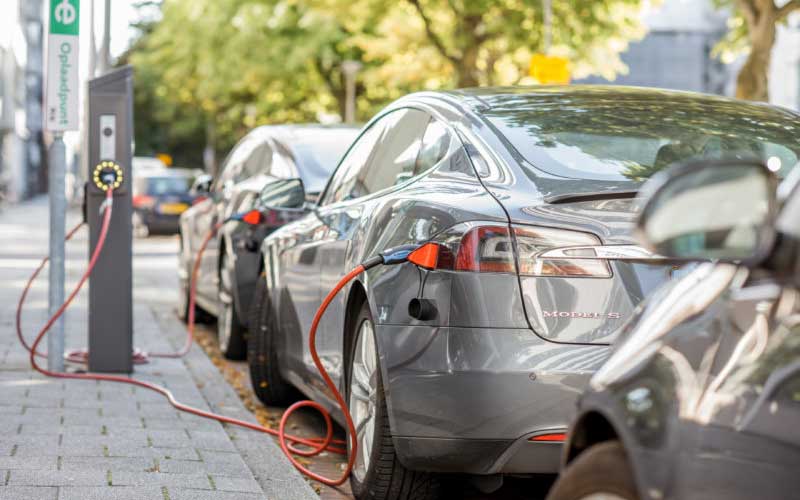
Photo Credit: Shutterstock
Massachusetts has long been a leader in promoting clean, climate-friendly electric cars and trucks. And now, the Commonwealth is taking another leap forward in ending our reliance on gas- and diesel-powered vehicles.
A recent order from the Massachusetts Department of Public Utilities gives the green light to Eversource, the region’s largest energy company, to invest in infrastructure to charge electric vehicles. This infrastructure is essential if electric cars and trucks are to hit the tipping point with consumers and businesses. And this approval is historic; Eversource is the first utility in the Northeast to receive approval for such an infrastructure program. It could also set the stage for similar programs across New England, which will provide a critical jump-start to our electric car market.
We applaud this decision by the Commonwealth, as well as a groundbreaking new requirement for Eversource to make its energy infrastructure resilient in the face of climate change impacts. But unfortunately, the Department missed the opportunity to move Eversource forward on other important initiatives, such as much-needed efforts to modernize our grid to take better advantage of innovative clean energy options.
Climate change is an urgent problem, and we don’t have time to waste. While making progress on electric cars is crucial, we need more leadership from Governor Baker to ensure all utility programs are helping to modernize and improve our entire electricity system, which will benefit New England families and businesses.
It’s Critical to Invest in Infrastructure to Support Electric Cars
Electric cars and trucks are a win-win-win: they save drivers money, reduce dangerous air pollution, and help our climate. The number of people buying electric cars in Massachusetts is at a record high, but still far from where it needs to be to achieve the state’s ambitious climate, public health, and clean transportation goals.
The Commonwealth’s lack of infrastructure to conveniently charge electric cars is one barrier that stops people from making the switch from their gas guzzler. Unlike gasoline-powered cars, which require drivers to stop at the gas pump, electric cars can conveniently fuel up anytime they are parked near an outlet—even while drivers are working or sleeping. But some drivers worry that they will not be able to easily or quickly charge their car, whether at home or on the road. This is especially true for renters, apartment-dwellers, and others who lack the ability to install a charger at home.
That’s why Eversource’s charging infrastructure program is so important. Eversource plans to invest $45 million to reduce the cost to prospective owners of installing charging stations in locations across Massachusetts, with a particular focus on apartment buildings, workplaces such as universities and hospitals, and public parking spaces such as at shopping centers and train stations. And in some communities that historically have been overburdened with pollution and lacked equal access to clean transportation, Eversource will also rebate the cost of the charger to the new owner.
Overall, Eversource aims to help install 4,000 public charging stations across Massachusetts by 2022, which will more than quadruple the number of public chargers in the state. In addition, Eversource will help install several “fast chargers,” which are capable of charging an electric car in 20-30 minutes, along highways and other high-traffic roads.
CLF Fought to Improve Eversource’s Program
CLF partnered with allies including Mass Energy and the Sierra Club to advocate for the best possible version of Eversource’s charging infrastructure program. Ultimately, the Department agreed with many of our recommendations, such as requiring Eversource to collect and report more data to facilitate learning and evaluation of this innovative program. Additionally, the Department agreed with our call for Eversource to set up processes for stakeholder engagement in program implementation and evaluation, expand the range of communities eligible for environmental justice benefits, and make sure Eversource spends funds on public chargers rather than upgrading its own trucks.
However, we’re disappointed that Eversource did not develop new rates for electric car charging. New rates are important to manage the additional electricity demand from these cars. Well-designed rates encourage drivers to charge their vehicles when it will provide the greatest public benefit, such as at night when electricity demand is low or during times when there is excess solar or wind energy generation, helping to reduce costs and emissions across the energy system.
Nonetheless, Eversource’s program is poised to provide many benefits for Massachusetts and the region. It marks an important beginning step, but also underscores that we have more work to do to ensure all Bay Staters and our climate benefit as more people start driving – and charging – electric cars.
There’s Work Ahead to Modernize Our Electric Grid
While the Department made big moves on electric cars and climate resilience, there’s still more work to do to prepare our electric system for the future.
This rate case decision left a lot on the table when it comes to updating our electricity grid. For instance, the Department approved Eversource’s proposed investments in energy storage, despite CLF’s concerns that the proposal called for a massive investment of customer money without sufficient details to support it, including a clear explanation of how these investments would benefit families and businesses and help achieve our clean energy goals.
Additionally, the Department incorporated some of the conditions recommended by CLF to protect customers and improve oversight. But it also it approved a questionable new scheme for Eversource to recover the costs of its investments in modernizing our grid without having to demonstrate that those investments resulted in real clean energy benefits. Grid modernization investments should help everyone, and CLF will continue to advocate for the Department to fairly balance profits for Eversource’s shareholders with benefits to families and businesses.
The Department deferred most of the big questions related to modernizing our electric grid to an order that it will consider separately. We look forward to that forthcoming order, and urge the Department to issue it soon. CLF has long pushed for more commitment, engagement, and investment in both grid modernization and electric vehicles, which will be good for our climate and public health, and help reduce costs for all energy users.
Governor Baker has helped position Massachusetts as a climate leader, but he needs to make sure every level of his administration is committed to putting the state’s transition to clean energy front and center—including his Department of Public Utilities.



